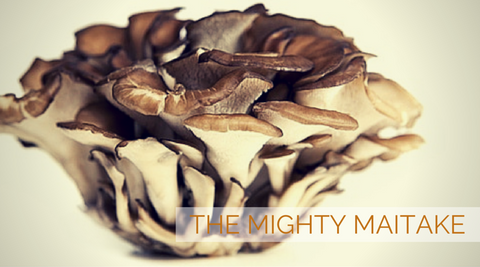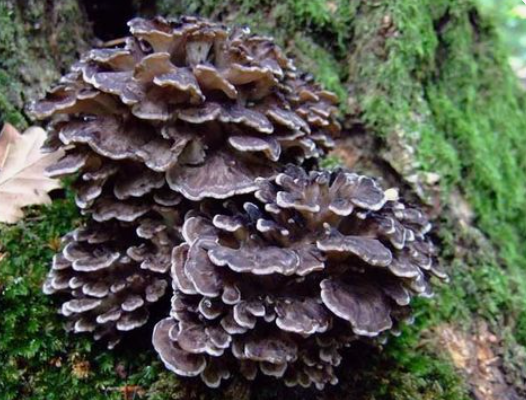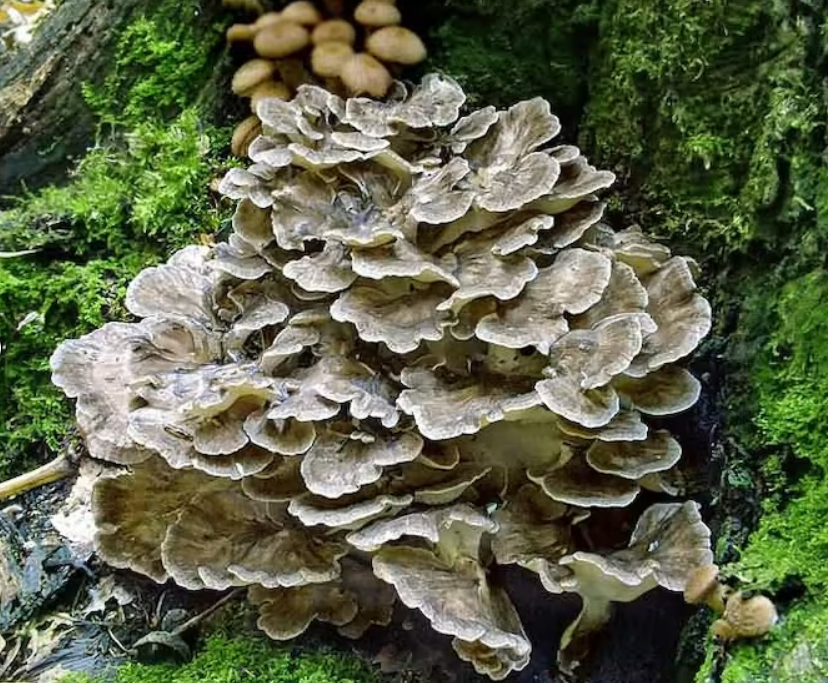exploring the world of mushrooms can yield some extraordinary similarities, too.
Fungi consumed for health purposes for thousands of years have their own representatives with similar benefits. These include chaga mushroom, reishi mushroom, and even the multi-colored, multi-faceted turkey tail mushroom.
Yet there’s one up-and-comer that is showing some strong promise in the world of mushrooms: the magical and miraculous maitake mushroom.

SOME COLORFUL MAITAKE HISTORY AND BACKGROUND
How was this delightful, beautiful, and healthy mushroom first stumbled upon and used in the first place?
Some of its origins can be found in its name. The word “maitake” is a Japanese word that means “dancing mushroom.”
When people came upon it and recognized it growing in the woods, they would often “dance for joy” because the mushroom was so delicious, healthy, and potentially medicinal.
Though it most likely started as subsistence food, consumption of the mushroom among various cultures showed a notable potential for increasing health and vitality. Certain cultures—particularly Asian cultures like the Chinese and Japanese—eventually adopted it also as a healing tonic and medicinal food.
Today, it is very widely eaten as both food and medicine, especially in Japan. In the western world, it is a prized culinary wild edible—in Italy, it is known as the signorina mushroom, which translates to “young lady” in English.
THE SIX TOP BENEFITS OF TAKING MAITAKE EVERY DAY
For thousands of years, maitakes have been celebrated as gourmet food. They’ve also been honored as a health-boosting medicine.
While today in the western world, they wouldn’t be considered an official curative “medicine,” they are indeed becoming popular as a supplement with many health benefits.

Some of these echo their historical uses in traditional medicine, such as from Asia, where it was classically used as a tonic for strengthening the body against weakness and disease. As they put it, it restored balance to bodily systems that were out of balance, to begin with, or that got that way due to disease or lack of self-care.
Today, these benefits translate into many research-supported and powerful holistic benefits. If this mushroom is consumed every day, over time, there could be some very desirable positive changes that health and the body could experience.
What could these be? Let’s take a look at them, and the science that supports each.
HELP BOOST IMMUNITY
More than any other trait this beautiful mushroom is known for, maitake is perhaps most praised and used for improving the immune system.
Studies show that the fruiting bodies of the fungus—the edible parts, of course—are rich in antioxidants. These come from phenols, glucans, polysaccharides, and even more compounds produced in the mushroom body.
By scavenging free radicals and reducing chronic inflammation, maitake’s compounds in effect support the immune system and help it act better. This makes it possibly very useful for a wide range of health conditions, ranging from better protection against colds and flus to autoimmune support.
One 2012 study even found that beta-glucans from maitake triggered antibodies to activate and fight some rather devastating chronic illnesses fully. Another similar study in 2014 showed the same: maitake helped strengthen the body’s innate immune response to overpower and rid itself of foreign invaders.
When taken every day, maitake could make a great supplement to keep immunity in tip-top shape—or even to help support immune-related conditions, if a doctor approves of it.
LOWER BLOOD PRESSURE
Beyond its antioxidant benefits to immunity, the compounds in this far-out mushroom don’t just empower the immune system and soothe chronic inflammation.
By helping reduce chronic inflammation throughout the body, maitake can also have some beneficial effects for gently lowering blood pressure.
Maitake is one of many botanicals that work as holistic hypotensives to lower blood pressure. This has been referenced in more than a few studies and modern reviews over the decades, and which can also be attributed to its antioxidant actions.
On its own, high blood pressure is considered a sub-clinical condition that isn’t exactly life-threatening. Instead, it’s the more significant illnesses that high blood pressure may lead to that are a cause for concern: such as an increased risk of heart disease or even an increased risk of stroke.
What this means is that, in effect, taking maitake every day can help reduce one’s risk of either heart disease and a stroke.
REDUCE RISK OF DIABETES
Regulating blood sugars a problem? Maitake is shown by research to have an ability to help with that, too.
Second, to the research showing maitake’s wonders for the immune system, there is a wealth of studies showing that it can positively alter blood sugars, and over time even protect against or support treatment for type 2 diabetes.
One 2014 study showed that the mushroom’s polysaccharides were hypoglycemic, meaning they lowered blood sugars. They also stopped insulin resistance from occurring, the precursor condition that can eventually pave the way to diabetes.
In another in 2015, maitake also demonstrated different benefits to type 2 diabetes, beyond just blood sugar regulation.
Though lots more studies are still needed before being able to call it or use it as an actual treatment for type 2 diabetes, it could nonetheless be helpful and all-natural support in addition to accepted treatments with its daily use as a simple nutritive tonic.
DROP ONE’S RISK OF CANCER
This wild mushroom boosts immunity on the one hand and can help protect against chronic disease on the other.
Research shows that it may have some powerful effects for lending its hand in the fight against one of the most dreaded diseases of all: cancer.
Like its other health benefits, this action is no doubt owed to its antioxidant activity. When antioxidants scavenge free radicals, they also tend to catch any and all developments of cancerous cells, too.
For this reason, maitakes make for an optimal supplement to strengthen health against cancer. Studies support it too, showing that the use of maitake extracts can even cause cellular death of cancer cells and tumors as well.
Lots of other research also points to maitake’s ability to slow, stop, and reverse the spread of cancer in laboratory tests. It’s far from ever being called a cancer treatment, but there’s no shadow of a doubt that it can be a healthy part of one’s regimen to protect one against cancer.
HELP WITH CHRONIC INFLAMMATION ISSUES
As part of its antioxidant characteristics, maitake mushrooms may help people who deal with chronic inflammation issues regularly.
This is because, by fighting free radicals, antioxidants can also help relieve chronic inflammation also, which tends to be caused by the damage done to tissues by those free radicals.
As such, getting extra antioxidants from maitake every day could give some long-term, holistic relief for chronic inflammation issues. Some that quickly come to mind are brain fog, fatty liver disease, rheumatoid arthritis, fibromyalgia, and even stress and depression.
Over a long period of time and in a holistic, gentle way, this could even bring pain relief into peoples’ lives, as well as help them manage conditions in addition to what their doctors recommend.
Studies already show that maitake can help with the chronic inflammation issues connected to immune problems, diabetes, even cancer, and more.
But underneath—and beyond—all that too, maitake’s antioxidant compounds means that it helps chronic inflammation of all kinds, everywhere in the body.
MAITAKE IS INCREDIBLY NUTRIENT-RICH
Is there more to maitakes than antioxidants? Definitely.
Nutrition data shows that maitakes could be considered very nutritious food. They’re rich in proteins and B vitamins and contain proper levels of phosphorus, potassium, dietary copper, and trace extras of additional other vitamins and minerals too.

Varied nutrition is essential for overall health—and maitake provides quite a bit, being comparable to the basic benefits of healthy fruits and vegetables.
By this logic, taking maitake every day could generally be considered a little health boost for the entire body, since every organ and system needs the widest variety of nutrients to function well and contribute to wellness and vitality.
Sure, it’s a health tonic in one sense of the word. But it shouldn’t be forgotten that maitake mushroom’s original role in culture, health, and culinary tradition was as a nutritious, delicious food.
source: https://primalherb.com/the-top-ways-that-maitake-will-help-benefit-the-body/
 Author: Lily Mazzarella
Author: Lily Mazzarella
neither plant nor animal nor mineral…….Get to know a mushroom!
MAITAKE (grifola frondosa) a.k.a. “Hen of the Woods“
If you have never eaten a maitake mushroom, I am a little jealous: you get to experience this exquisite creature for the first time. Maitake, known to many only in extract or supplement form, is by far my favorite eating mushroom. It’s been a few years since I’ve mushroom-hunted (and the California drought isn’t helping), but when I do, this is one of the handful of fungi I feel comfortable gathering in the wild.* This polypore grows in temperate, hardwood forests, in characteristic clusters at the base of trees—often oaks–that resemble the puffed-up tail feathers of chicken. It is prized and eaten world-round, from Japan to Italy to New York. They can be a little pricey—but are well worth it. These beauties can do a lot for you.
*That said, don’t collect mushrooms in the wild unless you are absolutely sure of what you are doing. Many mushrooms have “look-alikes” and every year people die from eating poisonous varieties.
Here’s a quick rundown of just a few of Maitake’s charms and benefits:
1. Extreme umami: Maitake is a rich source of l-glutamate, the amino acid responsible for the umami flavor we associate with savory foods. Once maitake is cooked and has lost its water weight, it is both nutrient-dense AND one of the most richly flavored foods around. As such, it requires little in the way of preparation, and satisfies vegans and omnivores alike. You’ll see what I mean when we get to the simple, delectable recipe below.
2. Immune modulator par excellence: Like other medicinal mushrooms, maitake is a full of immune-active compounds, including polysaccharides and sterols. Studies—including in vitro (“test tube”), in vivo (live cells or tissue), and in real live humans—show promise in multiple realms.
3. Breast cancer: Small human clinical trials at Sloan-Kettering found maitake extract to stimulate the immune cells of women with breast cancer.
4. Renal cell carcinoma: In vitro studies show promise for this difficult-to-treat and deadly cancer. Interestingly, 2 studies combined maitake extract with vitamins C and K to increase apoptosis (programmed cell death) of cancer cells.
5. Diabetes: Maitake has exhibited blood sugar lowering and insulin-lowering effects in multiple studies; it may also protect pancreatic islet cells, which produce insulin.
6. Intestinal Inflammation: In promising in vitro studies, maitake extract “turns down” TNF-alpha, an upstream inflammation-promoter. The mushroom contains potent anti-oxidants which may be responsible for this effect.
7. Immune stimulation/Anti-cancer: Multiple in vitro, in vivo, and human studies show that maitake can stimulate NK cell production and activity. NK cells offer first-line defense against virus and cancer-affected cells. Also shown: stimulation of bone marrow, anti-tumor, anti-angiogenesis, and increased induction of apoptosis of various cancer cell lines.
8. Reduction of chemotherapy toxicity?: A study in mice showed reduction in cisplatin-induced nephrotoxicity—kidney damage—and well as improvements in treatment outcomes when they were co-administered.
source: https://www.farmacopia.net/blogs/articles/get-to-know-a-mushroom-the-mighty-maitake

Everything You Should Know About Maitake Mushroom
“Maitake” means dancing mushroom in Japanese. The mushroom is said to have gotten its name after people danced with happiness upon finding it in the wild, such are its incredible healing properties.
This mushroom is a type of adaptogen. Adaptogens assist the body in fighting against any type of mental or physical difficulty. They also work to regulate systems of the body that have become unbalanced. While this mushroom can be used in recipes for taste alone, it’s considered to be a medicinal mushroom.
The mushroom grows wild in parts of Japan, China, and North America. It grows at the bottom of Oak, Elm, and Maple trees. It can be cultivated and even grown at home, though it typically won’t grow as well as it does in the wild. You can usually find the mushroom during the autumn months.
Although maitake mushroom has been used in Japan and China for thousands of years, it has only gained popularity in the United States over the last twenty years. People are praising this mushroom for its promises of health, vitality, and longevity.
Compared to other mushrooms, maitake has shown better results in preventing and treating cancer and other health conditions. Maitake also has a positive effect on overall immunity.
Maitake mushrooms are rich in:
- antioxidants
- beta-glucans
- vitamins B and C
- copper
- potassium
- fiber
- minerals
- amino acids
The mushrooms are also:
- fat-free
- low-sodium
- low-calorie
- cholesterol-free
Scientists are currently studying the unique way the mushroom supports overall health and fights illness.
Laboratory research suggests that maitake may be effective in treating certain illnesses. More studies are needed to confirm its effect on humans, but the current findings are promising.
Cancer
A 2013 study indicates that maitake D-Fraction could be useful in preventing and treating breast cancer. Researchers suggest that this mushroom can fight the growth and reproduction of cancerous cells.
Maitake mushroom has been shownTrusted Source to suppress tumor growth in mice. It can also increase the number of cells fighting against the tumor. This suggests that it could also be effective in managing cancer in humans when taken orally.
An earlier study found maitake D-Fraction, which is an extract, to be efficient in killing human cancer cells. It was taken alongside a protein that also fights cancer and succeeded in increasing the protein’s effectiveness.
Cholesterol
Researchers in a 2013 study found that maitake powdered extract lowered cholesterol levels in mice. It was also shown to increase fatty acids that provide energy. Because of this, researchers theorized that eating maitake mushroom may help keep arteries healthy.
Type 2 Diabetes
The results of a 2015 studyTrusted Source showed that maitake mushroom can have a positive effect on rats with type 2 diabetes. During the study, maitake mushroom consumption had a positive effect on glucose levels of rats. This points to the mushroom’s potential to treat type 2 diabetes in humans.
Maitake mushroom may also be useful in treating:
- cold and flu viruses
- high or low blood pressure
- immune function
- side effects of chemotherapy
If you’re using maitake to boost your health, you can add it to any food in which you would normally add mushrooms. It can be added to stir-fry, salad, pasta, pizza, omelets, or soup. You can also fry the mushrooms in butter or grill them. Maitake has a strong, earthy taste, so be sure you enjoy its flavor before adding it to a large amount of food.
If you’re buying maitake fresh, buy it whole to increase its shelf life. Store it in a paper bag in the refrigerator. You may be able to find it dried at some grocery stores. It freezes well, so you can keep it in stock if you are able to find it fresh. You can also freeze it raw.
Maitake may also be taken as a liquid concentrate or in dry form in capsules. If you decide to take it as a supplement, look for maitake D-Fraction, which is an extract of the mushroom.
The correct dosage depends your age, weight, and health. It also depends on the actual strength of a particular brand of supplement. Be sure to read the instructions carefully before use.
Always check with your doctor before taking a high dose, and monitor your reactions carefully. If you begin experiencing any unusual symptoms or discomfort, discontinue use and consult your doctor.
It may take a few weeks or months for you to feel a noticeable difference. Taking it with vitamin C is said to increase its benefits.
Maitake is digestible as long as the mushroom is not too old. If older, the mushroom’s toughness can make it difficult to digest. Cooking the mushroom can improve its digestibility.
Although allergic reaction and upset stomach is uncommon, it’s possible. More often than not, maitake mushroom is well tolerated.
If you have diabetes, you should consult your doctor before ingestion. Maitake may have an effect on your blood sugar. It may also lower your blood pressure, so be sure to discuss your options with your doctor if you have hypotension.
You shouldn’t ingest maitake mushroom within two weeks of surgery or if you have a bleeding disorder.
If you are pregnant, breast-feeding, or have an autoimmune disease, check with your doctor before use.
Maitake shows enormous potential for healing. There are no guarantees, but the possibilities are promising. Be sure to talk with your doctor if you wish to add this to your diet or take this as a supplement. They can go over the potential risks and benefits, as well as help advise you on the best option for you.
In general, you should:
- Look for 100 percent extract with no fillers. It’s important to know exactly what you’re getting.
- Do your research and only buy from a company who provides you with sufficient information about the product.
- Take special care if you are using it for diabetes or blood pressure. Be sure to check in with your doctor for approval or guidance.
- Remember that maitake can affect people in different ways.
You should also support your immunity and overall health by taking care of your well-being, both mentally and physically.
Terms of Use:The information presented on the network is intended to expand personal knowledge and provide general understanding in a variety of fields to help you be active your Creative freedom and nurturing your health. The information presented here does not pretend to be and is not a substitute for medical instructions. Everything presented on the network is the personal opinion of the writers and any decision regarding your action or health choice is your sole responsibility. with regards For complete inner freedom.
Outhematrix (out the matrix) Network management.








